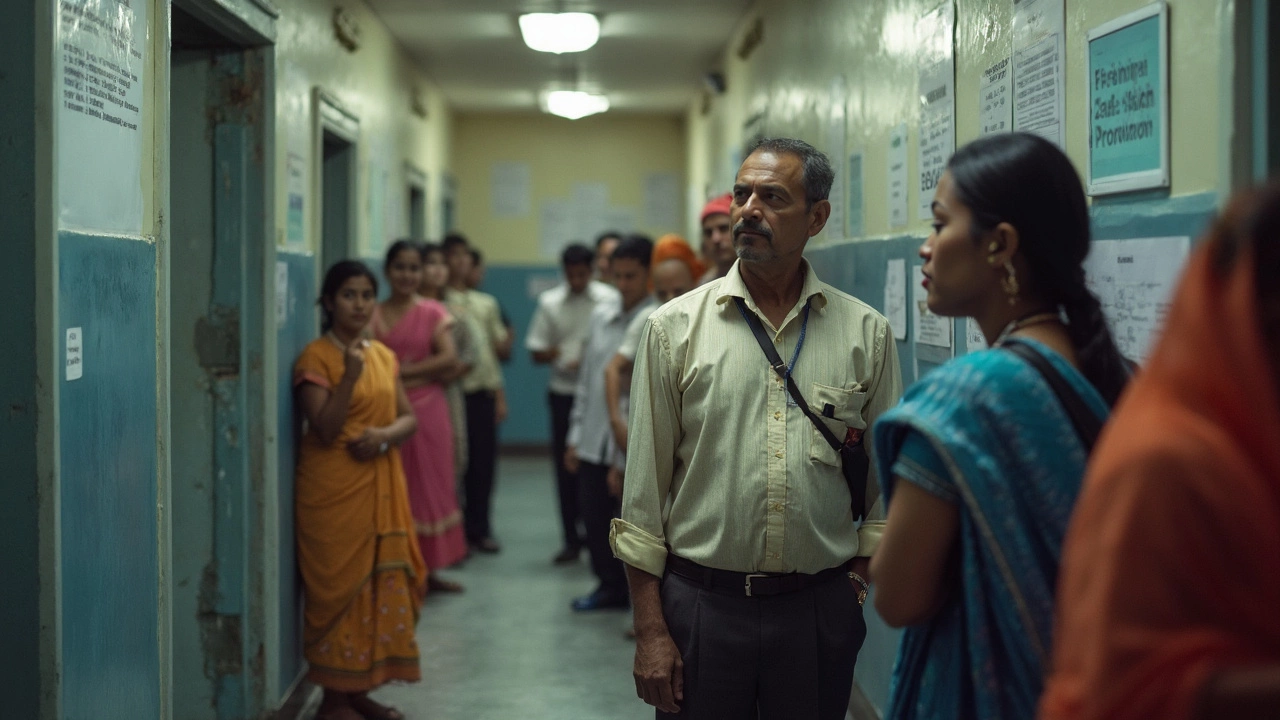Government Jobs: Hidden Downsides, Challenges, and Real-World Drawbacks You Should Know
 Jun, 28 2025
Jun, 28 2025
"Stable, easy, and safe." That’s what most people say about government jobs. But have you ever stopped to wonder what’s lurking behind that comfortable desk chair? Here’s the thing—every year, millions chase after the so-called "secure" path of public service. In India alone, about 20,000 people fight for each open position at the major government employers. It's almost like the lottery, except you actually have to study for it. But what happens after you finally land that gig? The hidden downsides often kick in where you least expect them.
The Slow March: Career Growth and Promotions in Government Jobs
Let’s talk about patience. If you think you can zoom ahead and climb the career ladder quickly, government service will throw a bucket of cold water on your dreams. Unlike the private sector, where ambition and performance are your golden tickets, most public jobs are firmly chained to seniority. Promotion lists move slower than a Monday morning. It doesn’t matter if you have brilliant ideas or work overtime every week—everyone’s moving at the same pace, following a set timetable.
It’s the kind of place where you could be stuck with the same job title for seven or even ten years before anyone hands you a new badge. In a lot of departments, like the Indian Railways or state-run banks, the average promotion cycle is closer to a decade than a few years. Take a look at senior civil service surveys: nearly 60% say they had no major promotion or change in responsibility for over 12 years. Sure, your job is safe, but your ambitions might need life support by the time an opening actually appears.
What about evaluation? Here’s some irony: a junior in a private startup could be running entire projects after a few good months; a government employee could work circles around their peers, but without an official opening or formal paperwork, it’ll go unnoticed. Seniority almost always trumps performance.
It can also get a bit demoralizing when you watch energetic new hires lose their spark. Most people start strong but hit the wall once they realize nothing really changes no matter how hard they push. This can spill over into daily work, where initiative gets replaced by "doing only what’s required." Ambition, meet red tape.
Here's a practical tip: if you're thinking about a government job and value fast-track growth or regular challenges, consider roles that have clear promotional exams and transfer policies. And don't be afraid to ask current employees about actual experiences—they’ll give you the real scoop.
Bureaucracy Overload: Rules, Red Tape, and Daily Frustrations
If you ever complained about company meetings dragging on, get ready for government paperwork. Public workplaces live by procedures—often, out-of-date ones. Even getting your leave approved can feel like running a gauntlet. Many departments still require multiple physical signatures, hard copies, and forms that seem designed as an endurance test. A 2022 World Bank review found Indian government offices still spend nearly 40% more time on paperwork than equivalent-sized private companies in the same city.
The focus is not efficiency but accountability, so nearly everything is triple-checked, stamped, and filed. You want to launch a new idea—maybe digitize a process or start a green project? Instead of a quick nod, you’ll usually face several months of committee reviews and administrative "clearance." A classic story you’ll hear: one officer proposed a remote working pilot in 2020. It took nine months for approval because it crossed five desks, and by then, everyone had moved on.
What does this mean in simple terms? Job satisfaction can take a real hit. Even people who join full of ideas sometimes admit they spend more time "following procedure" than actually doing impactful work. You might get paid every month, but days feel longer when you'll need signatures from five people just to fix a broken fan.
Want to cope? Here’s a survival plan: keep your paperwork organized, build good relationships with the admin team, and always stay on top of official procedures. Sometimes, insider knowledge on who really approves what can save you days or even weeks.

Job Security: Blessing or a Trap?
Everyone loves the words "job security." It’s why so many parents push for government jobs, and rightly so—you’re extremely unlikely to get fired for poor performance. But there’s a flip side most folks don’t talk about. Ironically, job security can breed complacency, leading to a work culture where "just getting by" becomes the norm.
In environments where layoffs are rare, people soon realize they have little to fear. The pressure to innovate or improve drops fast. Research by the Indian Institute of Management in 2023 showed that, in public offices, 44% of surveyed workers admitted they "stopped putting in maximum effort" after their job became permanent or was "regularized." Higher-ups often won't push underperformers out; they just transfer them somewhere else—the infamous "punishment posting."
This safety net can trap motivated people. You’ll probably encounter colleagues who have mentally checked out and just show up for the paycheck. This can chip away at morale and drag down the work culture. People sharing the same workspace, but not the same drive, often leads to frustration.
Let’s not gloss over the money part either. Yeah, you get pensions and steady pay hikes, and in places like the U.S., government jobs still deliver better retirement benefits than most private companies. But if you’re looking for big bonuses or significant pay leaps for hard work, you'll find pay structures are set in stone. In fact, according to estimates by Glassdoor, senior government officers in India earn about 40–60% less than private sector equivalents by the time they retire, bonuses included. Want to earn big? It rarely happens here.
Bottom line: if comfort is your top priority, and you’re okay with slow-paced days, this isn’t a huge disadvantage. But people who love a challenge or want to carve out a unique career may find public jobs feel a bit like quicksand—safe, but sticky and hard to escape from once you're in.
The Silent Stress: Transfers, Politics, and Work-Life Balance
Ask anyone who’s been in public service long enough, and you’ll hear grumbling about transfers—unexpected ones at that. Senior officers and even junior clerks sometimes get sent to a new city or rural location with only a few weeks’ notice. This isn’t just a minor inconvenience—imagine uprooting your family with little warning. A 2023 survey of central government staff found over 30% had transferred cities at least twice in five years, often with little say in where they were sent.
Workplace politics? They’re alive and kicking. In some departments, favoritism and old-school power games still decide who gets the best assignments. You might watch less-qualified folks get plum roles based on connections, not competence. There are stories of people waiting years for fair postings, especially if they don’t play the political game well—or worse, get caught up in someone else’s feud.
Then there’s the myth of an easy work-life balance. While some government jobs stick to a nine-to-five, others are notorious for their demands. Police officers, revenue officials, and railway controllers sometimes end up working late nights or weekends during election seasons or emergencies. In healthcare roles, like government doctors (even at major Delhi hospitals), 7-day weeks are common, and planned leaves can get canceled by the department’s orders.
Balancing home and work is complicated when the rules keep changing. Even bank employees at public sector units deal with mandatory yearly transfers, making it tough for kids’ schooling and spouses’ jobs. This adds another layer of unspoken stress to what’s supposed to be a "stable" career path.
So, thinking about a government job? It pays to look past the surface. There are undeniable perks, but the trade-offs—slow promotions, government jobs bureaucracy, job security traps, and the threat of sudden transfers—can shape your daily life in ways you might not expect. Ask around, talk to people in the sector, look at real data, and go in with your eyes wide open.
| Aspect | Government Job | Private Sector |
|---|---|---|
| Promotion Rate (average) | Every 7-10 years | Every 2-3 years |
| Job Security | Very High | Moderate |
| Risk of Sudden Transfers | High | Low |
| Performance Bonus | Rare/Fixed | Common/Merit-based |
| Paperwork Load | Heavy | Lighter/Digital |
| Retirement Benefits | High | Varies |
Do your homework before signing on for "a lifetime of stability." Real rewards come when you know exactly what you’re walking into—and what it’ll take to thrive.